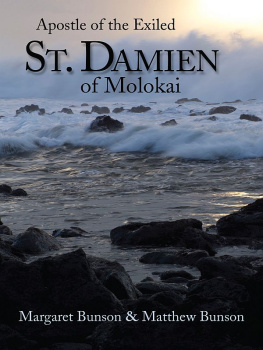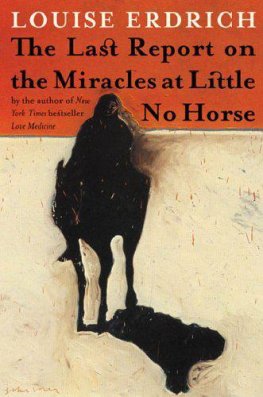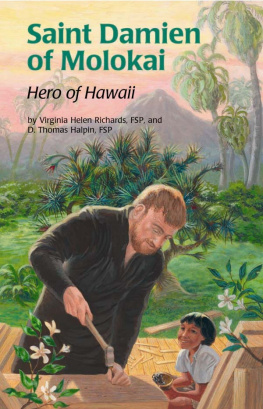A postle of the E xiled
S T. D AMIEN
of M olokai
A postle of the E xiled
S T. D AMIEN
of M olokai
Margaret R. Bunson and Matthew E. Bunson
Our Sunday Visitor Publishing Division
Our Sunday Visitor, Inc.
Huntington, Indiana 46750
Unless otherwise attributed, all photographs appearing in this work have been made available through the courtesy of the Archives of the Roman Catholic Church in Hawaii, with the permission of Bishops Clarence Silva and Francis X. DiLorenzo. The authors are grateful to those authors, publishers, and other individuals who have kindly made their materials, published and otherwise, available for use in preparing this work.
Every reasonable effort has been made to determine copyright holders of excerpted materials and to secure permissions as needed. If any copyrighted materials have been inadvertently used in this book without proper credit being given, please notify Our Sunday Visitor in writing so that future printings of this work may be corrected accordingly.
Copyright 1989, 1997 (under the title Father Damien: The Man and His Era), 2009 by Our Sunday Visitor Publishing Division, Our Sunday Visitor, Inc.
Published 2009.
14 13 12 11 10 2 3 4 5 6 7 8 9
All rights reserved. With the exception of short excerpts for critical reviews, no part of this work may be reproduced or transmitted in any form or by any means whatsoever without permission in writing from the publisher. Contact:
Our Sunday Visitor Publishing Division
Our Sunday Visitor, Inc.
200 Noll Plaza
Huntington, IN 46750
1-800-348-2440
.
ISBN: 978-1-59276-610-9 (Inventory No. T812)
LCCN: 2009931814
Cover design by Becky Heaston
Cover art: Shutterstock
Interior design by Sherri L. Hoffman
PRINTED IN THE UNITED STATES OF AMERICA

This book is dedicated to
Stephen M. Bunson, 19622008
T ABLE OF C ONTENTS

FOREWORD

I CONSIDER MYSELF THE HAPPIEST missionary in the world, wrote Damien from Molokai, the Hawaiian island where he lived and died in the service of those with leprosy. He was referring to a strange kind of happiness, given that he lived in extreme conditions, had conflicts with his companions and his superiors (because of misunderstandings and his stubborn personality), and suffered in his own body the terrible process of decay caused by leprosy, finally dying from the disease.
Who is this man whose life, in spite of the passing years, continues to impact us so powerfully? The fascination Damien produces has changed the life of many, inspiring both religious and humanitarian commitment. Damien is not just ours. He does not just belong to the brothers of his Congregation, whom I represent. He is a universal brother, a model of humanity, apostle to those with leprosy, a hero of charity, an inspiration for every human being called to serve the outcast and forgotten. He is a source of pride for Belgians and Hawaiians and shining light to the whole Church.
Of course very few who have felt the attraction of Damien have lived as he did, in such radical service to the poorest and most forgotten of the earth. Today we no longer understand mission or the struggle against suffering as a form of proselytism going hand in hand with cultural, political, or economic colonialism as might have been the case in the nineteenth century. All that said, Damien, with his deep desire to proclaim the Gospel, his very particular kind of love for the suffering, and his profound sense of joy that no one could take from him, continues to be a powerful inspiration inviting us to give similar meaning to our own existence. What is the secret of a life like his?
Seen from the outside, Damien certainly appears to be a giant of humanity, generosity, and service to the poor and abandoned. All of that is true, and because of Damien the way the world looks at leprosy patients was transformed. Many people have found in him the inspiration to grow in human virtues such as solidarity and commitment to justice for the marginalized.
However, if you really want to know who Damien is, then you have to get inside, where that strange happiness took form, the happiness of a man who saw himself first and foremost as a believer, a priest, a son of the Sacred Hearts of Jesus and Mary, and a missionary of the God of mercy and compassion. As he often said, he found the strength needed to remain faithful to his mission in the Eucharist and at the foot of the Lords cross. Only if we know this secret can we understand this strong, robust, and enterprising man, who as a young religious left his Flemish homeland to go to the other side of the world, where he would give himself to the end for his most forgotten brothers and sisters.
Damiens vitality comes from within, from his heart, where God was working, creating for us an outstanding image of the merciful heart of his Son, Jesus.
This biography is being published as the Church prepares to canonize Damien, officially including him in the list of saints. The book is not just about Father Damien of Molokai but Saint Damien. From the perspective of our faith (which was the way Damien saw things), this gives us a deeper insight into the secret to which we referred.
For the Church, canonization is not just the exaltation of a hero or the granting of an honorific title to a group or an institution. The Church does not canonize someone to highlight certain values or some ideology. Canonization is primarily an act of praise to the God of love and mercy, who pours forth his compassion on us by transforming the lives of his saints through the power of his Spirit. So often, as in the life of Damien, Gods action is hidden in the misery that is so much a part of human history.
With the canonization, the Church proclaims that Damien belongs to God. He can only be understood in terms of his belonging to the Lord of life, who shaped him and made him his own. Holiness is the work of the Lord. It is his love that justifies us.
According to brother Joseph Dutton, faithful companion of his later years, Damien had many character defects, but they were consumed like straw by the fire of his charity. That fire is Gods fire, a love stronger than death, a fire that even torrential rains cannot extinguish. It is the same fire we see in images of the Heart of Jesus: a pierced and suffering heart yet overflowing with passion and life. Damien had a heart like that.
By canonization the Church honors Damien. It recognizes in a public and official way the exceptional quality of his life and work. During his life and after his death, Damien was praised and slandered, admired and condemned. In his letters, he leaves us the testimony of the suffering caused by loneliness and misunderstanding. At one point he even thinks that he might be unworthy of heaven. We could say that the canonization dissipates those doubts and proclaims the profound truth of his existence. This is a man of God. The choices he made and the things he did pleased God and gave witness to him.
The Church, by canonizing Damien, recognizes him as a model to be imitated. By doing that, it makes a judgment about what is good and what is not good. There is a difference. Abandoning people to their misery is not the same as serving the forgotten. Seeking ones own well-being is not the same as sacrificing oneself for the happiness of others. Ignoring the poor and living well is not the same as loving those living on the margin of society. Keeping ones distance from the sick for fear of contamination is not the same as touching and embracing a leper. Living as if God did not exist is not the same as seeking him daily with a humble heart. Preserving ones life is not the same as giving it away out of love.
Next page












